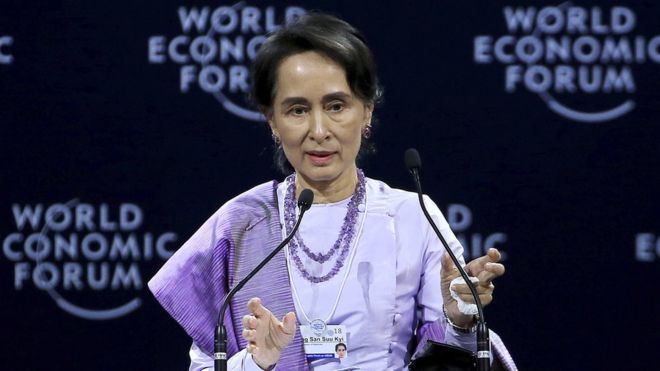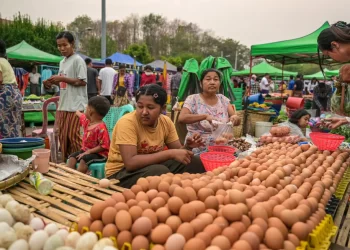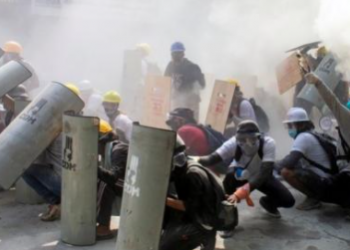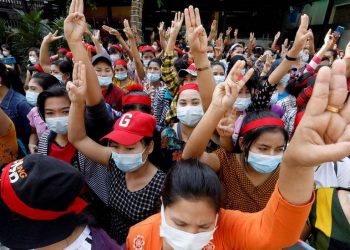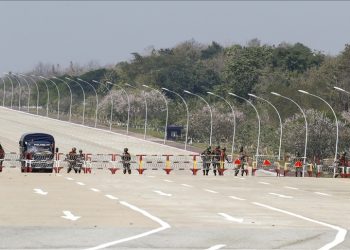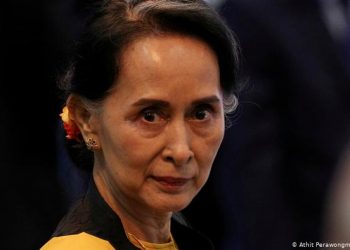Myanmar’s Aung San Suu Kyi has defended the jailing of two Reuters journalists, despite international condemnation.
She said Wa Lone and Kyaw Soe Oo had broken the law and their conviction had “nothing to do with freedom of expression at all”.
The two were sentenced for possession of police documents while investigating the killing of Rohingya Muslims.
Ms Suu Kyi also said her government could in hindsight have handled the Rohingya situation differently.
Since last year, at least 700,000 Rohingya have fled Myanmar, also known as Burma, after the army launched a brutal crackdown in response to attacks by a Rohingya militant group.
The UN has called for top military figures to be investigated for genocide.
What did Ms Suu Kyi say?
The Nobel Peace Prize laureate – who is not Myanmar’s elected president but is almost universally viewed as such – had been under intense pressure to comment on both the Rohingya crisis and more recently the journalists, following their jailing earlier this month.
Breaking her silence on Thursday in response to a question at an international economics conference in Vietnam, Ms Suu Kyi said the case against the international news agency journalists upheld the rule of law.
She suggested that many critics had not actually read the verdict, saying: “They were not jailed because they were journalists, they were jailed because…the court has decided that they have broken the Official Secrets Act.”
The two, she added, had “every right to appeal the judgement and to point out why the judgement was wrong”.
How tarnished is her reputation?
The 73-year-old former activist, who spent more than a decade under house arrest during the military junta period, was once seen as a global human rights icon.
But her perceived failure to stop the rape and killing of Rohingyas has sullied her international reputation and several honours have been withdrawn.
However, she remains very popular in Myanmar, where many people see the Rohingya as interlopers from Bangladesh.
Human Rights Watch responded to Ms Suu Kyi’s speech by saying that she “got it all wrong”.
“She fails to understand that real ‘rule of law’ means respect for evidence presented in court, actions brought based on clearly defined and proportionate laws, and independence of the judiciary from influence by the government or security forces,” Deputy Asia Director Phil Robertson said.
“On all these counts, the trial of the Reuters journalists failed the test.”
What was the case against the journalists?
The Reuters pair were sentenced to seven years in prison on 3 September for violating the state secrets act while investigating a massacre of Rohingya men by the military at a village called Inn Din.
The two Myanmar nationals had been arrested while carrying official documents which had just been given to them by police officers in a restaurant.
They said they were set up by police, a claim backed by a police witness in the trial.
Authorities later launched their own probe into the Inn Din killings, confirming the massacre had taken place and promising to take action against those who had taken part.
What’s the background to the Rohingya situation?
The Rohingya have faced decades of discrimination in Myanmar and are denied citizenship.
The latest crisis erupted in August 2017 when a brutal military crackdown was launched in far-western Rakhine state in response to a Rohingya militant group attacking more than 30 police posts.
Last month, a UN report said top military figures in Myanmar must be investigated for genocide in Rakhine state and crimes against humanity in other areas.
The report describes the army’s response – including murder, torture, rape, sexual slavery, persecution and enslavement – as “grossly disproportionate to actual security threats”.
Ms Suu Kyi has not criticised the powerful military but on Thursday admitted that, in hindsight, “the situation could have been handled better” by her government.
“But we believe that for the sake of long-term stability and security we have to be fair to all sides,” she said. “We cannot choose and pick who should be protected by the rule of law.”
This week, a UN rights body accused Myanmar of “waging a campaign against journalists” and the verdict has sparked criticism internationally, including from US Vice President Mike Pence.
–
Source: BBC

